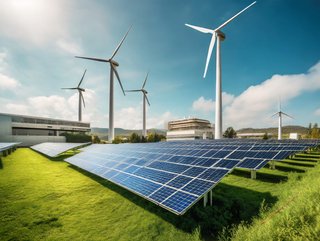How can energy costs be balanced in healthcare?

If the healthcare industry were a country, it would rank as the fifth-largest carbon emitter on the planet. A staggering 4.4% of global carbon emissions can be attributed to the crucial activities carried out within the healthcare sector. This encompasses everything from the transportation of emergency vehicles to powering the lights in pharmacies and managing the supply chain of medical equipment and pharmaceuticals.
To mitigate the environmental impact of the healthcare sector, numerous organisations are adopting energy-efficient practices. These range from transitioning to renewable energy sources to incorporating sustainable designs into their buildings.
Chris Rengstorf, Senior Director of Commercial Solar Operations at IGS Energy, heads operational management in the energy retailer’s Commercial Energy Services (CES) division. His team provides commercial and industrial customers with cutting-edge renewable energy solutions, including solar power, lighting solutions, building controls, electric vehicle supply equipment, and other advanced electrification products.
Rengstorf, who joined IGS Energy in 2011 after international consulting stints, emphasises the company's commitment to leading the transition towards a more sustainable energy future. IGS Energy, the third-largest energy retailer in the U.S., serves over 1 million commercial and residential customers nationwide.
Reducing emissions sector-wide
The healthcare sector is known for its high energy consumption, prompting IGS Energy to diversify its product portfolio. Starting as a natural gas supplier in 1989, the company has since expanded to offer various innovative solutions. The decision to provide renewable energy products stemmed from a growing demand from customers.
"We first began offering solar energy to customers in 2014 and turned on our first projects in 2015. We’ve installed on-site solar for customers large and small, in public, private, and nonprofit spaces. We’re currently the fifth largest on-site solar developer in the USA," says Rengstorf.
For healthcare organisations seeking to reduce energy usage, whether for cost savings or sustainability, the challenge lies in knowing where to start. Rengstorf suggests focusing on efficiency upgrades and measures to reduce overall energy usage before delving into sustainable options like clean energy.
"Operating with as little energy as possible should be every business’ priority, especially one that uses a great deal of energy. But to get started with efficiency upgrades, a healthcare business must first understand their energy usage today," recommends Rengstorf. An energy audit or real-time monitoring solution can provide valuable insights for benchmarking usage and verifying the impact of improvements.
"After taking this first step, organisations can more intentionally explore other sustainable technologies and options with their energy partner, whether that’s buying grid power with renewable energy credits (RECs) or exploring solar," explains Rengstorf. "These decisions come down to your goals: operating more sustainably, saving money, placing long-term energy hedges, or all of the above."
Goal-driven sustainability strategy
To determine if on-site power generation through solar power is suitable for a business, Rengstorf advises engaging in a nuanced conversation with internal leaders, subject matter experts, and an energy supplier who can provide holistic guidance.
"Consider the goals. If the primary goal is cost savings, it’s important to understand your organisation's electric bills in general and the demand charges specifically," states Rengstorf. Depending on the market, solar may or may not offset all portions of the electric bill. However, on-site solar can serve as a long-term hedge against rising energy rates.
"By answering these questions and with the aid of a third-party group like IGS, your organisation can quickly identify if solar investment makes sense today," adds Rengstorf. Site suitability is a crucial factor, and if solar is not feasible, options such as green energy contracts with renewable energy credits (RECs) or community solar should be considered.
"Green energy contracts can help organisations support renewable projects through the purchase of RECs and allow the organisation to claim green power," notes Rengstorf. "Community solar, similar to a green energy contract, enables customers to enroll in and then buy power directly from solar projects located somewhere else on the grid."
When establishing an energy strategy, Rengstorf emphasises the importance of determining the appetite for risk in a volatile energy market. Working with experts who understand the available options is essential for managing risk effectively.
"In a volatile energy market - as we’ve experienced for the last couple of years - having a strategy designed to meet your business’s unique needs is essential for managing risk," asserts Rengstorf. For businesses considering on-site generation, a thorough analysis of opportunities is necessary to understand the implications and return on investment.
Looking ahead, Rengstorf anticipates continued market volatility in the future, presenting both risk and opportunity. He advises organisations to collaborate with energy companies proficient in both commodity supply and renewable generation to navigate these challenges successfully.
"As we go forward, it’s going to be even more essential that organisations work with energy companies who are experts in both commodity supply as well as renewable generation," concludes Rengstorf.
*******************
Make sure you check out the latest edition of Energy Digital Magazine and also sign up to our global conference series - Sustainability LIVE 2024.
*******************
Energy Digital is a BizClik brand.






